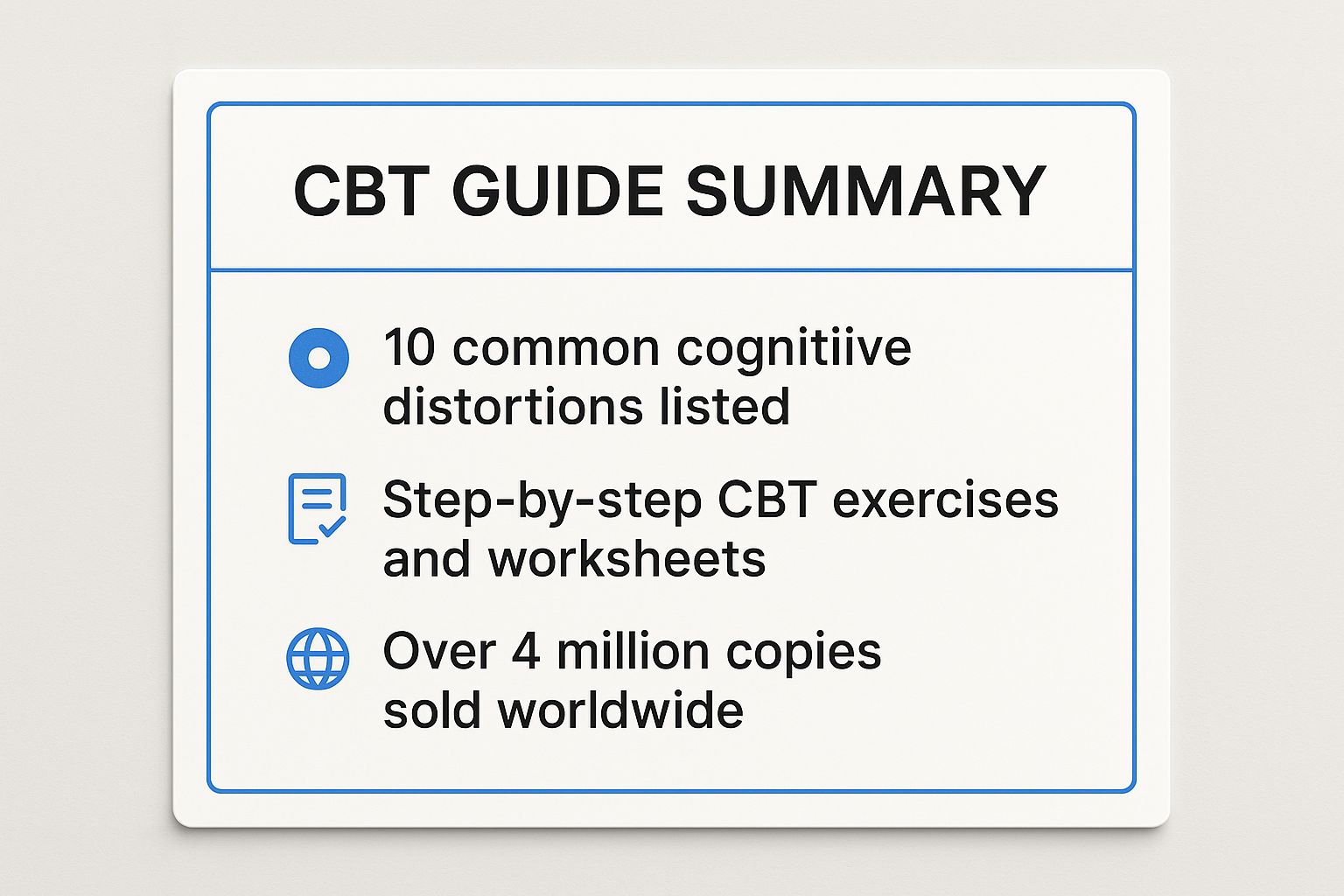Developing a growth mindset begins with a simple but powerful idea: your abilities aren't set in stone. They can grow with deliberate effort and consistent practice.
Instead of seeing a challenge as a threat, you can view it as an opportunity. It becomes a chance to learn, stretch your skills, and improve. This small shift in perspective is the first step toward building resilience and a stronger sense of well-being.
Your Path to a Growth Mindset Starts Here
If you’ve found this guide, you may be facing a hurdle or simply feel a pull to grow. That curiosity is the perfect place to start. The journey from a fixed mindset—believing our talents are unchangeable—to a growth mindset is about embracing your ability to develop through dedication.
This isn’t about chasing an unrealistic idea of perfection. It’s about valuing the process and celebrating progress, not just the final outcome. Think of it as a practical tool for managing everyday pressures, like workplace stress or anxiety, and improving your overall well-being.
Fixed vs. Growth Mindset: What's the Real Difference?
The distinction between these two mindsets comes down to how you see your own abilities. Are they static traits you were born with, or can you actively develop them over time? Your answer shapes how you react to almost everything, from feedback to setbacks.
A fixed mindset can feel limiting, while a growth mindset is dynamic and ready to learn. This isn't just a positive concept; it's a fundamental principle for building resilience and navigating challenges like stress and anxiety. To make this clearer, let's look at how these mindsets appear in daily life.
Fixed Mindset vs Growth Mindset at a Glance
| Situation | Fixed Mindset Response | Growth Mindset Response |
|---|---|---|
| Facing a Challenge | "I'm not good at this. I should avoid it." | "This is tough, but it's a chance to learn." |
| Putting in Effort | "If I have to try hard, it means I'm not smart." | "Effort is the path to mastery." |
| Receiving Feedback | "This feels like a personal criticism." | "This is useful information. How can I improve?" |
| Success of Others | "Their success makes me feel inadequate." | "Their success is inspiring. What can I learn?" |
As you can see, it's not the situation but the internal response that defines the mindset.
Why Nurturing a Growth Mindset is Worth the Effort
Making this mental shift can have a positive impact on your well-being and personal growth. It gives you the power to approach difficulties with curiosity instead of fear. This is a vital skill for handling life's complexities with more compassion and happiness.
Just think about the tangible benefits:
- Deeper Resilience: You bounce back from setbacks faster because you see them as lessons, not judgments.
- Stronger Motivation: When you believe your effort makes a difference, you're more likely to stay engaged.
- Better Relationships: A growth mindset helps you communicate more openly and work through conflicts.
- Less Stress and Anxiety: Focusing on the learning journey reduces pressure and feelings of being overwhelmed.
This emphasis on development is being recognised at a national level in India. The 2020 National Education Policy (NEP) is built around fostering growth mindsets in students. It shifts the focus from rote memorisation to experiential learning to build curiosity and resilience. You can learn more about how these principles are shaping education in India.
Adopting a growth mindset isn't about becoming a different person. It's about unlocking your potential by changing how you think about challenges, effort, and growth.
Get to Know Your Fixed Mindset Triggers
Before building a growth mindset, it helps to get familiar with what activates your fixed mindset. This isn’t about self-judgment; it’s about becoming a curious observer of your thoughts and feelings. These triggers are the specific moments or thoughts that lead you to believe your abilities are static.
This often happens when we feel vulnerable, like getting unexpected feedback or facing a new challenge. These situations can bring up feelings of inadequacy or fear, causing our minds to revert to a defensive state. Spotting this pattern is your first move toward making a change.
What Puts Your Fixed Mindset on High Alert?
Triggers are incredibly personal, often tied to past experiences or beliefs about success and failure. When you encounter one, your mind might jump to conclusions like, "I'm not smart enough for this," or "I knew I would fail." This is a normal human reaction—our brain's way of protecting us from disappointment.
The goal isn't to ignore these feelings but to simply notice them. This simple act of awareness is how you start to regain control of your inner narrative and ease feelings of anxiety. Common triggers include facing criticism, hitting a roadblock, comparing yourself to others, or stepping into the unknown.
A Simple Exercise in Self-Awareness
One of the best ways to pinpoint your triggers is through quiet reflection, perhaps with a journal. This is for informational purposes, not to diagnose a problem. You're just gathering information to understand yourself better.
Think back to a time you felt defensive, discouraged, or stuck. What was happening? What thoughts were running through your mind? Don't analyze or fix anything yet; just observe. This is how you start building the self-compassion needed for real growth.
"The first step toward change is awareness. The second step is acceptance."
– Nathaniel Branden
You can't change what you don't see, and you can't see it clearly if you're constantly criticizing yourself. This mindful approach is a fantastic tool for managing workplace stress and building the kind of resilience that helps you thrive.
The Inner Voices of a Fixed Mindset
When a fixed mindset is triggered, it often has a distinct voice—usually critical and focused on limitations. Learning to recognize this voice is a game-changer. For instance, you might hear a voice of judgment ("You're just not a natural at this") or a voice of fear ("Don't try; you'll only embarrass yourself").
By naming these voices, you create space between you and the thought. That gap is where you can choose a different response. If these thoughts feel overwhelming and contribute to feelings of depression or severe anxiety, professional counselling can provide supportive strategies. Remember, reaching out for therapy is a proactive step toward caring for your well-being.
Practical Ways to Reframe Your Inner Dialogue
Once you start noticing your fixed mindset triggers, you can learn to challenge the thoughts that follow. This is where you can make tangible changes, gently guiding your mind from "I can't" toward "How can I?" This isn't about fake positivity; it’s about acknowledging your first reaction and then consciously choosing a more constructive perspective.
This practice is central to building the mental well-being you need to handle life's challenges with more grace. Acknowledging your effort and showing self-compassion are key.

Embrace the Power of "Yet"
One of the simplest, most profound shifts you can make involves adding one small word: "yet." Tacking it onto the end of a self-critical thought instantly turns a dead-end statement into a bridge toward future growth. For example, "I can't handle this project" becomes "I can't handle this project yet."
This subtle addition opens up space for curiosity and prompts the question, "What do I need to learn to get there?" It honours where you are now without accepting it as your final destination. It turns a feeling of inadequacy into a practical roadmap.
From Failure to Feedback
With a fixed mindset, failure can feel like a final verdict, sometimes leading to feelings of shame or depression. A growth mindset, however, sees failure as data. It’s valuable information that shows what didn't work so you can try a different approach.
When a project hits a wall, resist the urge to self-criticize. Instead, get curious and ask learning-focused questions like, "What's the key lesson here?" or "What would I do differently next time?" This pulls you out of self-judgment and into active problem-solving—a crucial skill for building resilience.
Focus on Process Over Perfection
The pressure to be perfect can be paralyzing and is a major source of anxiety. A healthier approach is to shift your focus from the final result to the process of getting there. Celebrate the effort, consistency, and small steps you take along the way.
A powerful example of this is visible in cultural shifts across India. A Columbia Business School assessment noted a growing cultural move towards growth mindset principles, especially among young people. This focus on the journey, despite challenges, is driving real change and is a brilliant example of how focusing on process creates powerful outcomes.
Catch and Rephrase Your Fixed Mindset Voice
Your inner dialogue shapes your reality. A practical skill is learning to catch your critical voice and rephrase its message. This requires mindfulness—noticing your thoughts without immediately judging them. Think of it as gently translating your thoughts into a more helpful language.
| If Your Fixed Mindset Says… | Try This Growth Mindset Reframe… |
|---|---|
| "I'm not smart enough for this." | "What can I do to learn more about this?" |
| "This is too difficult." | "This will take time and effort." |
| "I made a mistake. I'm a failure." | "Mistakes are proof I'm trying. What can I learn?" |
| "I'll never be as good as them." | "I admire their skills. What steps can I take?" |
If this process feels overwhelming, working with a professional through therapy or counselling can offer a safe space to explore these patterns. These techniques are tools for your mental toolkit. The goal is always progress, not perfection.
Build Growth Mindset Habits into Your Daily Life
A growth mindset is like a muscle you build over time through small, consistent actions. The goal is to move from knowing what a growth mindset is to actually living it. This is how you build the kind of resilience that helps you handle life’s challenges with more confidence and compassion.
It starts with reframing your goals. Instead of chasing a perfect outcome, focus on the learning process. For example, rather than saying, "I have to master this software by Friday," try, "This week, I want to get comfortable with its main features." This shift reduces pressure and can ease workplace stress.
Weave Learning into Your Everyday
You don't need to overhaul your life to integrate these habits. Look for small opportunities for learning and reflection in your existing schedule. For instance, end each day by asking, "What did I learn today?" This trains your brain to find lessons, even on tough days.
Another powerful habit is to actively seek constructive feedback. It can feel vulnerable, but it's one of the fastest ways to grow. Approaching feedback with genuine curiosity instead of fear is a practical way to live the growth mindset and improve your well-being.
Celebrate Effort and Practice Self-Compassion
We often celebrate only big wins, but a growth mindset honours the entire journey. Acknowledge your effort, especially when things are tough. This builds the internal motivation you need to keep going and is a powerful way to cultivate happiness.
This is where self-compassion is vital. Setbacks will happen; how you talk to yourself in those moments matters. Treating yourself with the same kindness you'd show a friend creates the psychological safety needed to learn and try again. It’s a crucial defense against burnout.
The goal is not to be perfect but to be a little better today than you were yesterday. Self-compassion is the fuel for this journey, helping manage feelings of anxiety and self-doubt.
Create a Supportive Daily Environment
Your daily routines have a massive impact on your mindset. Foundational habits can create the mental space you need for growth. While not mindset exercises themselves, they are critical for helping your brain adapt.
- Mindful Moments: Start with five minutes of quiet time to set a calm, intentional tone.
- Physical Movement: Regular exercise can lower stress and sharpen your thinking.
- Prioritise Rest: A tired brain often defaults to fixed-mindset thinking. Learning how to improve your sleep hygiene is essential.
If sticking to these habits is difficult, or if setbacks lead to persistent feelings of depression, professional support can help. Therapy and counselling provide a structured space to build these skills. Remember, any assessments used are informational tools to better understand your patterns, not a final verdict.
Navigating Challenges and Finding Your Support System
This growth mindset journey can be tough. When you’re already managing life’s pressures, stress, or anxiety, adding more "work" can feel overwhelming. If you're struggling, that's completely normal and okay.
The road to growth is not always straight. You will hit roadblocks, like perfectionism or fear of failure. These are not signs you're failing; they're just part of the process of building resilience.
When Self-Help Isn't Cutting It
There are times when reading articles and trying strategies on your own isn't enough. This is especially true if you're dealing with persistent feelings of depression or you're feeling burnt out. Realising this is a sign of self-awareness and strength.
It takes courage to admit you need more support. This is where professional help like therapy or counselling can be a game-changer for your well-being. It's a proactive, powerful step toward building the life you want.
Seeking support isn't about "fixing" a flaw. It's about partnering with a trained professional who can offer fresh perspectives, practical tools, and a safe space to explore the patterns holding you back.
A therapist can act as a guide for your inner world. They can help you build genuine resilience and navigate your mind with more compassion.
The Role of Professional Support
Working with a mental health professional provides targeted support that goes beyond generic advice. They can help you understand your fixed mindset triggers and create personalized strategies for handling things like workplace stress. A counsellor might use therapeutic techniques to help you reframe negative beliefs or manage the physical symptoms of anxiety.
It's also important to remember that a growth mindset is one piece of a larger puzzle. A recent study of 73 countries, including India, found that socioeconomic factors play a significant role in achievement. This reminds us why robust support systems are so essential. You can read the full research about these findings on Nature.com.
Using Assessments as a Starting Point
Psychological assessments and screening tools can be helpful, but it's important to see them for what they are: informational guides, not diagnoses. They are designed to give you insights into your thought patterns and emotional habits. They are not meant to be stigmatizing.
Think of an assessment as a map of your inner landscape. It can show you where your strengths are and point out potential challenges, giving you a clearer starting point.
- For Informational Purposes Only: These tools are for self-knowledge and should not replace a professional evaluation.
- A Starting Point for Conversation: You can use the results to start a more focused conversation with a therapist.
- Empowerment Through Understanding: Gaining clarity on your patterns can empower you to take the next best step for your well-being.
In the end, whether you're using self-help resources or working with a therapist, the goal is the same. It's about building a supportive ecosystem for yourself—one that fosters compassion, encourages learning, and helps you thrive.
Got Questions About Growth Mindset? Let's Talk.
As you begin to work with these ideas, questions will naturally come up. This isn't a one-size-fits-all process. Wondering if you're "doing it right" is a common and valid part of the experience.
Here are some honest answers to frequently asked questions. Think of this as a friendly guide for moments of uncertainty. Just by asking these questions, you're already engaging with the process—and that's a win for your well-being.
How Long Does It Take to Develop a Growth Mindset?
Think of it less like a race and more like building a fitness habit. There's no set timeline. Some people notice small shifts in a few weeks, while for others, it might take longer. Both paths are perfectly okay.
The most important ingredients are consistency and self-compassion. Focus on making small, sustainable tweaks to your inner monologue. Celebrating your effort is key to making it stick and building happiness.
A growth mindset isn't a final destination. It’s a continuous, evolving way of meeting life's challenges. The real win is in the daily practice of choosing curiosity, which builds true resilience over time.
Can You Have a Growth Mindset in Some Areas but Not Others?
Yes, absolutely. This is incredibly common. You might have a growth mindset about your career but a fixed view of your creative talents or relationships. Our beliefs are often shaped by past experiences.
The first step is to notice these differences without judgment. Where do you feel flexible and open? Where do you feel stuck? Recognizing these patterns is a huge insight. From there, you can gently apply reframing techniques to those specific areas.
What If My Workplace Has a Very Fixed Mindset Culture?
This is a tough situation. Working in an environment that punishes mistakes can be challenging. While you can't change the culture on your own, you can control how you respond and nurture your own mindset.
Focus on what is within your influence. Model the behaviour you want to see by talking openly about what you're learning. Acknowledge the workplace stress and make self-compassion a priority. Seek out colleagues who also value learning.
If the environment leads to serious anxiety or burnout, professional counselling can be a vital support. A therapist can equip you with robust strategies to manage external pressures. Your mental health and growth are important.
Ultimately, this journey is about building a more compassionate and empowered relationship with yourself. It's about giving yourself permission to be a work in progress—to learn, stumble, and get back up.
If you're looking for guidance on your mental health journey, DeTalks offers a safe and trusted platform to connect with qualified therapists and explore confidential, science-backed assessments. Start building resilience and clarity by finding the right support for you.


















